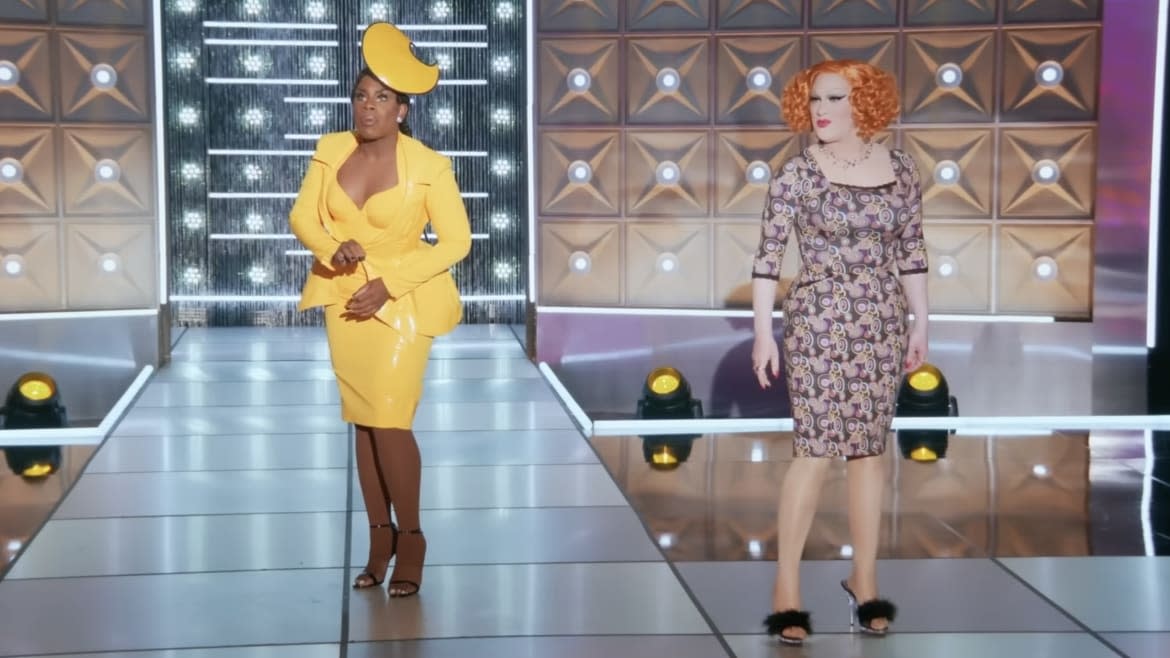The ‘RuPaul’s Drag Race’ Scene That Ascended TV to a Higher Plane of Gayness

- Oops!Something went wrong.Please try again later.
- Oops!Something went wrong.Please try again later.
I’m a person who shrieks while watching TV. I live alone. There are days when I don’t speak with another human. Shrieking makes me feel alive.
But no shriek has ever been shrieked in my apartment quite like the shriek I shrieked when our collective mother, RuPaul, announced that the “lip-synch for your legacy” on Friday night’s episode would, for the first time in RuPaul’s Drag Race herstory, be a spoken-word performance—to a classic scene from the sitcom Designing Women.
The volume, the pitch, the power of the shriek: Mirrors cracked on the International Space Station. My apologies to the astronauts.
There are likely people for whom that assemblage of words makes no sense. (Hi straights!) But for fans of RuPaul’s Drag Race, which is currently airing its first-ever All Stars season cast composed entirely of past winners, it was a moment that warranted Ru's histrionic pronunciation of “legendary.” Quite simply, it was the gayest thing I have ever seen on TV.
I don’t mean that in a glib way. It was a past-meets-present collision of formative, meaningful queer pop culture. It was great television, but it was also deceptively profound.
The speech from Designing Women used in the Drag Race lip-synch has, in the decades since it first aired, become a foundational text for queer people. A marginalized community found strength and validation in the steely formidableness of Dixie Carter’s Julia Sugarbarker and felt seen in the sharp intelligence of the campy, almost drag-like humor that defined the show. These ladies could read each other for filth.
In the speech, Carter’s Julia is confronting a woman who was bullying her sister, Delta Burke’s Suzanne Sugarbaker. She erupts into a monologue about Suzanne’s accomplishments as a former beauty queen that is volcanic in its fierce passion but effective—and damn near terrifying—in its measured control, the Julia Sugarbaker way.
“When she threw that baton into the air, it flew higher, further, faster than any baton has ever flown before,” Julia says, her voice evoking a predator stalking its prey with each staccato word, all culminating in the classic mic drop: “And that, Marjorie—just so you will know—and your children will someday know—is the night the lights went out in Georgia!”
Or, rather, Jor-jah!
One of the reasons it’s become so beloved by the gay community has to do with the show. Designing Women, along with Golden Girls, was also one of the series airing in the late ’80s that featured provocative and educational storylines about the LGBT community that lacerated through the conservative moral panic at the time. The episode “Killing All the Right People,” in which Julia shames a friend for her misinformed, hateful perspective on AIDS and the gay community, is still one of the most powerful episodes on the topic to have ever aired, even decades later.
And here is that other famous Designing Women speech, spotlighted on the Emmy-winning reality competition series that is credited with bringing drag culture, queer humor, and LGBT issues into the mainstream.
The thing about this moment is: That Designing Women speech is so good. So good. I remember seeing it for the first time while watching reruns of the series on Lifetime after school when I was maybe 10 years old—a baby gay is born—and being enthralled.
It embedded itself in my psyche, the fiber of my very being, the first time I saw it. I’d revisit it on YouTube over the years. As I got older, I realized that it had become an indelible part of queer culture. Drag queens would perform it at bars (cue my shrieking each time). The recent, wonderfully heartwarming Disney+ film Better Nate Than Never featured a young, questioning musical theater-lover auditioning for a Broadway production with the monologue (cue shrieking from my couch). The most physical activity I’ve gotten all summer was my full-body freakout when RuPaul announced that it would be the show’s first-ever spoken-word lip-synch.
What Classic Sitcoms Taught Us About Gay Rights
Here’s the other thing about this moment: The queens who delivered it were sensational. The glory of this season of Drag Race is that, because they’re all past winners, each contestant is spectacular and you’re essentially just watching drag superstars deliver uniform excellence week after week. Jinkx Monsoon and Monet X Change nailed every nuance of Dixie Carter’s original delivery, telegraphing her rage, her composure, and her ferocious devotion to her sister—the latter, sisterhood, being a powerful thing for the gay community.
The moment was not only a blast, but it also meant something. It was TV that was undeniably GAYYYYY—and an elevated, poignant celebration of gay culture.
More, it rekindled some excitement in Drag Race, with people on social media throwing out their suggestions for what should be the next spoken-word lip-synch. And what’s gayer than a bunch of Drag Race fans making demands rooted in their encyclopedic knowledge of pop culture on Twitter?
petition for the Nicole Kidman AMC monologue to be a lip sync on the next winners season 🙏
— Aquaria 🤌🏼 (@aquariaofficial) July 11, 2022
the next drag race spoken word lip sync pic.twitter.com/HWeqBX3Yis
— Danny Pellegrino (@DannyPellegrino) July 10, 2022
next drag race spoken word lipsync pic.twitter.com/zUwngC8eiN
— dean (@deanevangeliou) July 10, 2022
This needs to be the next Drag Race spoken word lip sync pic.twitter.com/zM6ueslEeP
— Ryan Aguirre (@aguirreryan) July 9, 2022
If this isn’t the next spoken word lip sync on drag race I don’t want it pic.twitter.com/oAQsq5XUp0
— Bob (@tweetsbybob_) July 10, 2022
If Drag Race needs an idea for their next spoken-word lipsync, I’ve got just the one:
pic.twitter.com/WnHUCOxanV— Carly Rae PrEPsen (@JEBextor) July 9, 2022
Get the Daily Beast's biggest scoops and scandals delivered right to your inbox. Sign up now.
Stay informed and gain unlimited access to the Daily Beast's unmatched reporting. Subscribe now.

